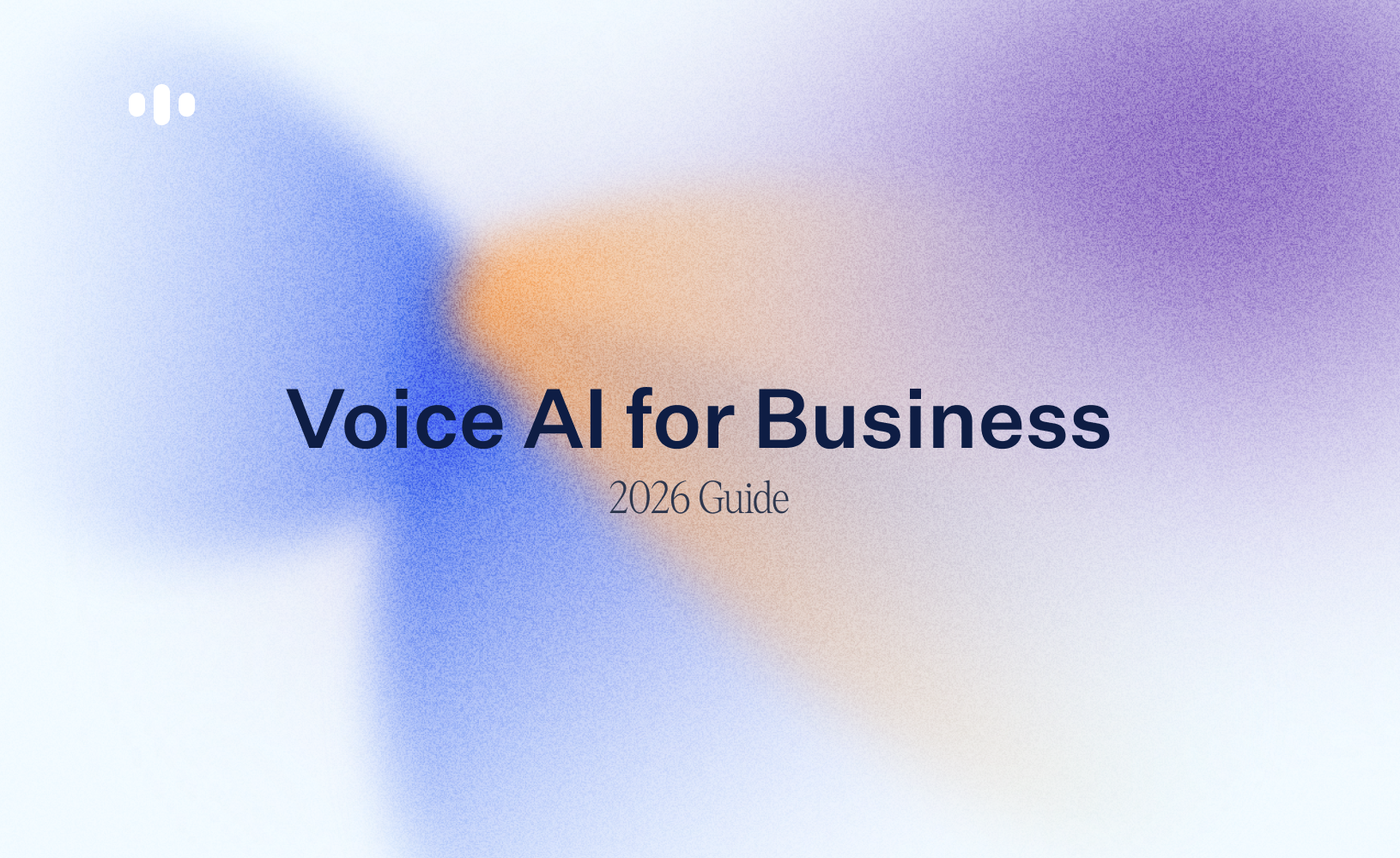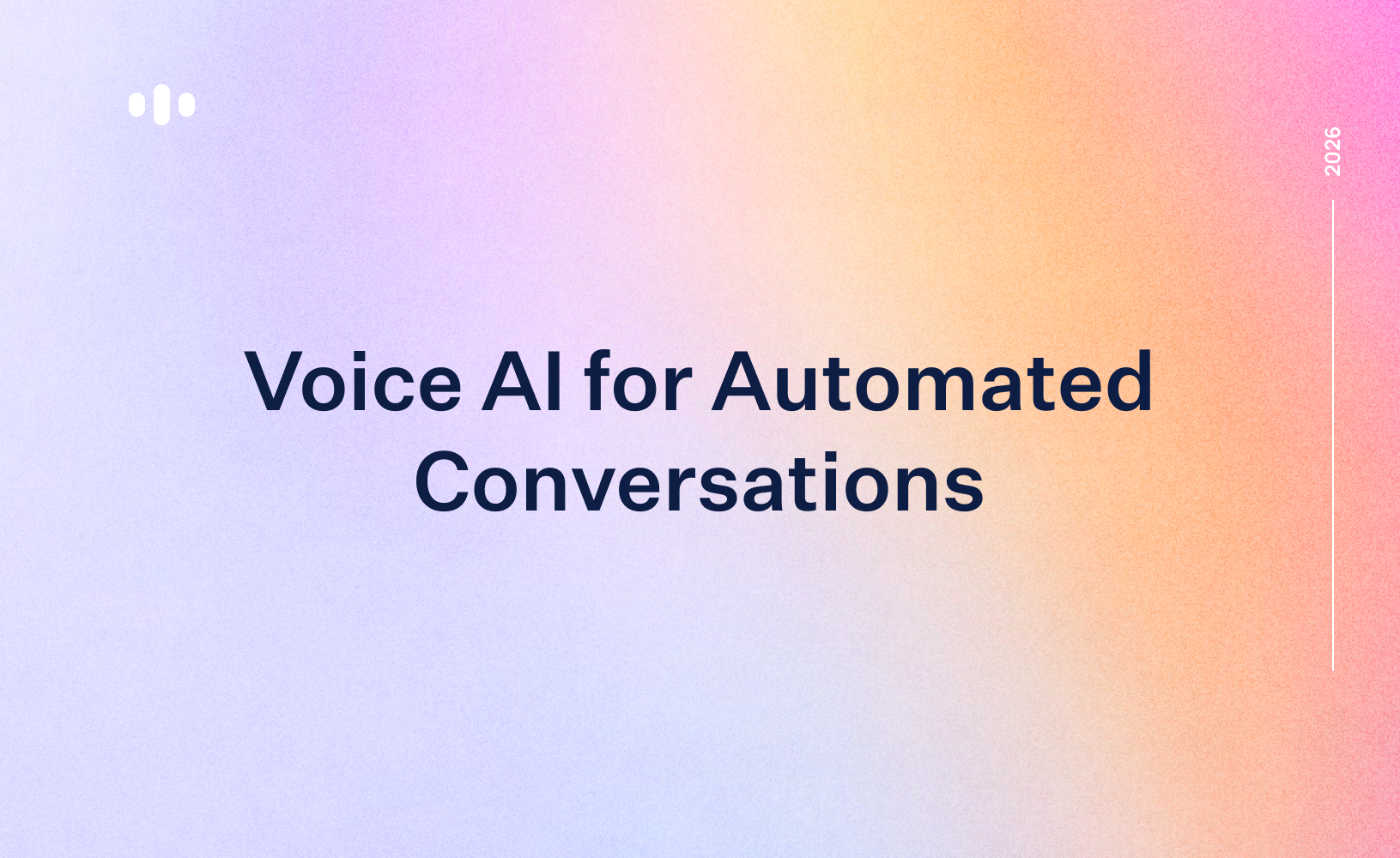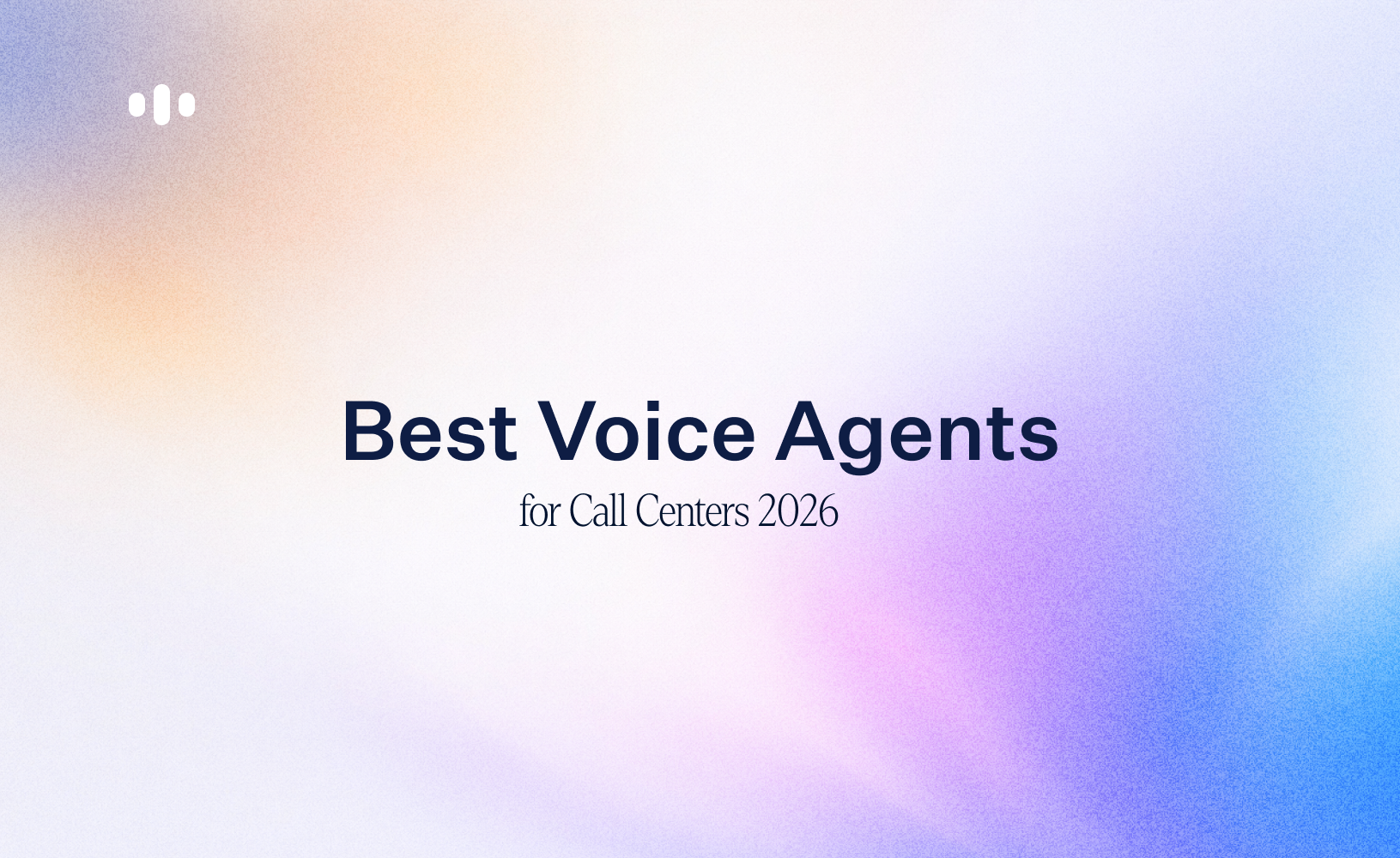Conversational AI is reshaping how businesses communicate, automate, and grow.
Kore.ai is a major player in the conversational ai space, but there are many ai alternatives available that can meet a variety of enterprise automation needs.
In the past few years, we’ve seen more and more companies turn to AI-powered voice agents to handle everything from inbound support calls to proactive sales outreach.
Kore.ai has become one of the most recognized platforms in enterprise conversational AI, yet in practice, many teams are now outgrowing the traditional “bot platform” model.
In this article I’ll walk you through some of the best Kore.ai alternatives for voice AI, platforms built to help teams launch faster, integrate deeper, and deliver more natural, human-sounding conversations at scale, and help you choose the right conversational ai platform for your needs.
What is Kore.ai?
Kore.ai is an enterprise-grade conversational AI platform that lets businesses design, build, and deploy intelligent chatbots and voice assistants. Key features include a visual bot builder, omnichannel support, detailed analytics, and pre-built integrations across popular channels.
Its strength lies in omnichannel reach, Kore.ai assistants can operate on web, mobile, messaging, and telephony, creating a seamless experience for end users. The platform also offers advanced AI capabilities such as natural language processing and integration with enterprise systems, along with detailed analytics and reporting to help teams measure performance and uncover insights from every interaction.
In terms of pricing, Kore.ai bills per 15-minute conversation session for chatbots and uses per-seat pricing for contact center deployments, with seamless integration to enterprise contact center systems.
Plans start around $50/month for Essential and $150/month for Advanced, but in practice, most enterprise implementations land closer to $300K per year.
Constraints and Limitations of Kore.ai
Despite its strengths, Kore.ai has several limitations that may lead businesses to seek alternatives:
- Complex Implementation: The platform’s extensive features can make implementation a complex and time-consuming process, often requiring significant technical expertise. New users may also face a steep learning curve during onboarding.
- Limited Native Voice Automation: While Kore.ai supports voice, it is not a voice-first platform. This can result in limitations for organizations with complex voice-based workflows, such as those looking to deploy AI receptionists or automated call-routing systems..
- Heavy Engineering Requirements: Customizing and maintaining Kore.ai bots can require a dedicated team of engineers, which can be a significant investment for some organizations.
- Tiered Pricing: Kore.ai‘s pricing is tiered and can be complex, making it difficult for businesses to predict costs and budget effectively.
- Voice Latency: Some users have reported latency issues with Kore.ai‘s voice capabilities, which can impact the quality of real-time conversations. Additionally, users report delays in support or response times during high-volume periods.
- Rigid Architecture: The platform’s architecture can be rigid, making it challenging to integrate with certain third-party systems or to create highly customized conversational flows. Integration with legacy systems can be particularly challenging.
How to Choose the Right Conversational AI Platform Alternative to Kore.ai
Ease of Use and Implementation Speed
Platform usability, especially a user friendly interface, determines how quickly teams can design, test, and deploy voice agents to production, empowering business users to work efficiently. Evaluate whether the platform offers no-code or low-code interfaces that empower business users, or if it requires dedicated engineering teams for every modification.
Pricing Transparency and Cost Structure
Conversational AI pricing models range from transparent pay-as-you-go structures to opaque enterprise contracts requiring extensive negotiation.
Retell AI ($0.07-$0.08/minute) and Synthflow ($0.08/minute) publish clear per-minute rates enabling accurate cost forecasting. In contrast, enterprise platforms may start at $150,000-$300,000 annually with additional fees for usage, integrations, and support. For some platforms, the number and complexity of call flows can also impact the cost structure, as more intricate call flows may require higher pricing tiers or custom quotes.
Compliance and Security Requirements
Regulated industries must evaluate deployment options (cloud, hybrid, on-premises), data residency controls, and compliance certifications. Healthcare organizations require HIPAA compliance, financial services need PCI DSS, and European operations must satisfy GDPR mandates.
Channel and Integration Capabilities
Assess whether the platform supports required communication channels including phone systems, web chat, mobile apps, WhatsApp, SMS, voice channels, and emerging channels. Support for voice channels is a key aspect of omnichannel communication, enabling real-time, low-latency interactions and seamless integration with chat platforms. Additionally, compatibility with a wide range of telephony providers ensures greater flexibility, especially for organizations with specific compliance or data residency needs. Platforms offering broad telephony integration provide greater flexibility than those centered on single providers.
Scalability and Performance
Voice AI platforms must handle growth in call volumes, concurrent conversations, and geographic expansion without performance degradation. Evaluate latency metrics, platforms achieving sub-500ms response times (like Retell AI, Vapi, Synthflow) deliver more natural conversational experiences than higher-latency alternatives.
Organizations planning international expansion should confirm multilingual support and low-latency infrastructure in target regions.
Analytics and Continuous Improvement
Comprehensive analytics enable teams to measure performance, identify improvement opportunities, and demonstrate ROI. Essential metrics include call completion rates, containment rates (percentage resolved without human escalation), average handling time, customer satisfaction scores, and conversation outcomes.
Best Kore.ai Alternatives for Voice AI
1. Retell AI
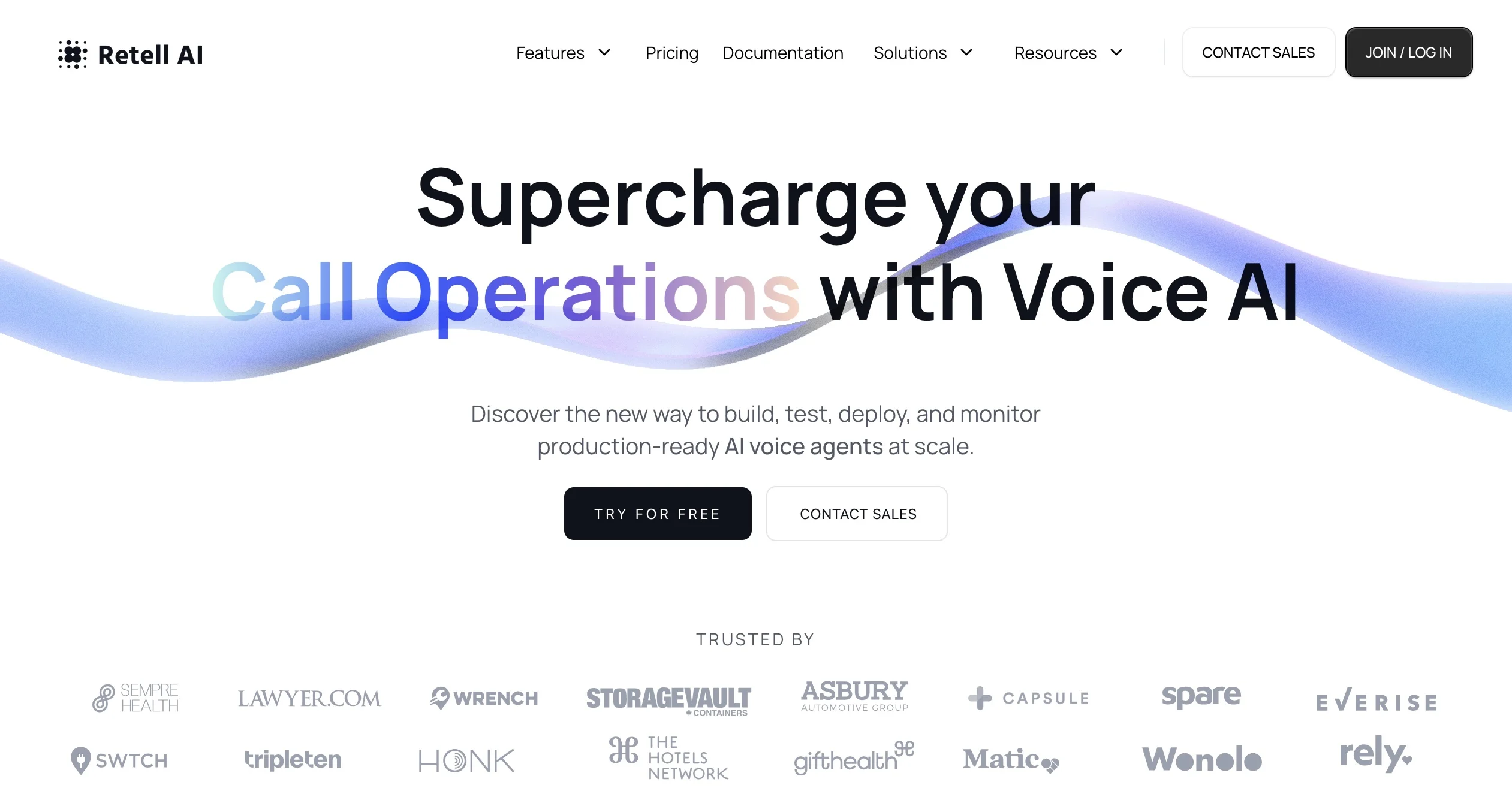
Retell AI is a cutting-edge conversational AI platform that specializes in automating enterprise phone calls with AI voice agents. It is designed to provide a natural conversational experience, with a focus on low latency and high-quality voice interactions.
Advantages Compared to Kore.ai
- Voice-first foundation: Retell is purpose-built for phone and voice workflows, not adapted from chat systems. It delivers ultra-low latency, natural conversations that feel fluid and human, ideal for real-time call environments like healthcare, finance, or logistics.
- Usage-based pricing: Retell follows a transparent pay-as-you-go model (starting around $0.07/min), so teams can forecast ROI easily and avoid the large upfront enterprise contracts that Kore.ai often requires. Retell also helps automate internal processes and supports complex workflows, making it suitable for organizations with advanced automation needs.
- Native telephony flexibility: Retell connects directly to PBX, SIP, and VoIP systems, and supports Bring-Your-Own-Carrier setups, letting you keep your existing infrastructure.
- Built-in outbound and inbound support: From warm transfers to batch calling and DTMF handling, Retell supports both proactive and reactive call use cases out of the box.
- Conversational automation: Retell AI delivers advanced conversational automation, enhancing call handling, agent assistance, and customer interactions for improved enterprise communication and efficiency.
- Rich call analytics: Every call is transcribed and analyzed, providing detailed insights into performance, intent accuracy, and agent efficiency, without needing third-party add-ons.
- Enterprise-grade compliance: Retell is compliant with SOC 2 Type II, HIPAA, and GDPR, making it ready for regulated industries without the heavy compliance overhead.
- Multilingual scalability: Retell supports 30+ languages and high-quality voice options across regions, making it easy to launch local-language lines or multilingual campaigns with minimal setup.
- Cost-effective scaling: Teams using Retell report cutting call-handling costs by up to 80% compared to traditional IVR systems, thanks to its pay-per-minute model and auto-scaling infrastructure.
Pricing
Retell AI offers a transparent, usage-based pricing model, which can be more cost-effective than Kore.ai's tiered pricing for businesses with fluctuating call volumes.
Costs are broken down by component: the conversational voice engine is priced per minute, ranging from $0.07 to $0.08 depending on the chosen voice. Added to this is the cost of the language model (LLM), which is also per minute and can range from $0.006 (for models like GPT-4o mini) to $0.06 (for Claude 3.5).
G2 Rating: 4.8/5 (612 reviews)
Review: "Retell AI has completely transformed the way we manage automated calls, with impressive voice quality and understanding".
Recommended for:
Enterprises that require a high-quality, real-time voice AI solution for customer support, sales, or other voice-centric applications.
Build your first Retell agent in minutes for free.
2. Sierra AI

Sierra AI deploys advanced AI agents for customer service that are uniquely trained to align with a company's specific brand identity.
These agents can reason, predict, and take action not just based on a knowledge base, but also by adhering to the company’s tone, values, and policies for a highly personalized interaction.
Advantages compared to Kore.ai
- Brand-aligned AI agents: Sierra lets you train agents on your company’s exact tone, values, and policies, so every interaction sounds on-brand and consistent, unlike Kore.ai’s more generic NLP responses. Sierra also delivers custom solutions tailored to your business needs, providing flexibility that rigid platforms lack.
- Emotion-aware conversations: Built-in sentiment and tone detection allow Sierra to adjust its language and pacing in real time, creating more empathetic and human-feeling experiences that Kore.ai’s rule-based flows can’t fully replicate.
- Reasoning and action capabilities: Sierra agents can analyze context, predict intent, and take real actions (like updating CRMs or triggering workflows) autonomously, while Kore.ai’s automation usually depends on pre-scripted logic.
- Faster omnichannel deployment: With pre-built templates and native support for chat, email, social media, and voice, Sierra goes live in weeks rather than months, a major advantage over Kore.ai’s heavier, developer-dependent setup. Sierra AI efficiently handles customer queries, ensuring high self-service rates and seamless support experiences.
Pricing
Sierra’s pricing begins at approximately $150,000 annually, making it a more cost-effective alternative for sophisticated AI.
Final pricing is customized based on agent complexity and expected interaction volume. This structure provides a lower total cost of ownership compared to Kore.ai while delivering powerful, brand-aligned automation.
G2 Rating: 4.3/5 (12 reviews)
Review: "User friendly, fast and many supported languages. Very complex setup process and more bugs then competitors".
Recommended for:
Customer-centric brands where a consistent voice and adherence to company policy are critical, especially in telecommunications and financial services managing diverse customer segments.
3. Parloa
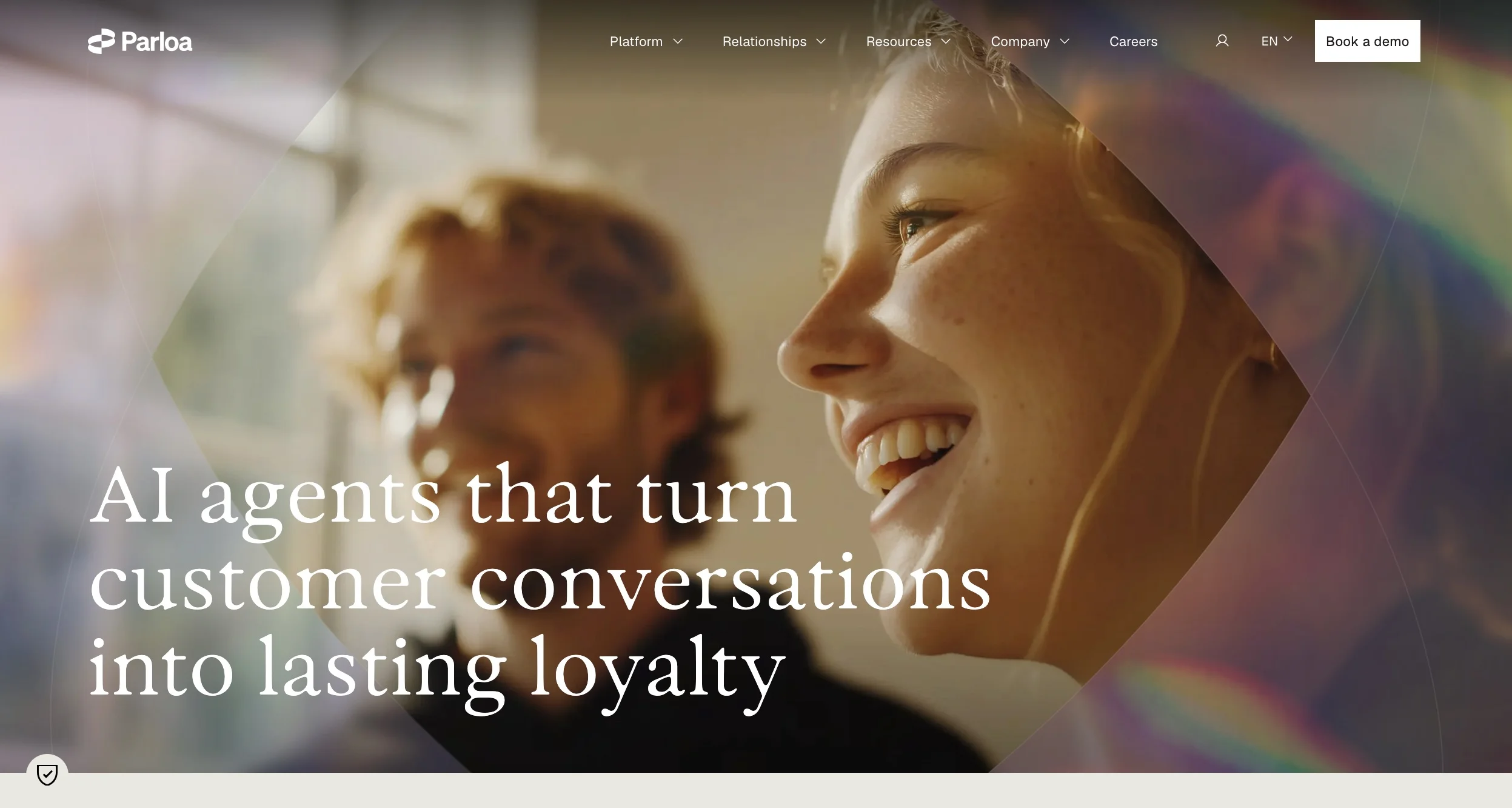
Parloa is a generative AI platform built for scaling customer support in enterprise environments, with a primary focus on robust governance and compliance.
It provides a comprehensive toolset to manage AI behavior and meet stringent regulatory standards in sensitive industries.
Advantages compared to Kore.ai
- Governance-first architecture: Parloa gives you tools like simulation testing, content filtering, and real-time monitoring so you can preview agent behavior and keep it in control, a level of oversight many Kore.ai deployments don’t offer out of the box.
- Comprehensive compliance stack: Parloa carries certifications like ISO 27001, SOC 2, GDPR, HIPAA, and PCI DSS, making it especially suited for regulated industries.
- Low latency in production: Parloa can deliver conversational performance with latency as low as ~700 ms, helping the dialogue feel more natural and responsive.
- Advanced natural language understanding: Parloa leverages state-of-the-art natural language understanding to interpret and process human language, enabling more intuitive and effective conversational AI solutions.
- Agent assist features: Parloa offers robust agent assist tools, including real-time support, conversation intelligence, and AI-driven coaching to help contact center agents improve performance and streamline customer service.
- Safe scaling with risk mitigation: Because Parloa’s governance tools are baked in, scaling to higher conversation volumes has less risk (less hallucinations, off-brand responses, or compliance slips), whereas adding layers of safety in Kore.ai often requires custom engineering or add-ons.
Pricing
Parloa uses a custom pricing model based on conversation volume and the specific compliance and governance features required.
The enterprise-tier structure reflects its deep investment in certifications and regulatory tools, positioning it as a premium choice for organizations where compliance is a non-negotiable, mission-critical requirement.
G2 Rating: 4/5 (1 review)
Recommended for:
Financial services, healthcare, and insurance companies operating under strict regulatory frameworks that demand comprehensive audit trails, data security, and verifiable compliance certifications.
4. PolyAI

PolyAI delivers highly advanced voice assistants engineered to handle complex, human-like conversations.
The platform excels where customers interrupt, change topics, or make mistakes, managing multi-turn dialogues and context switches that challenge simpler conversational AI systems.
Advantages compared to Kore.ai
- Human-like realism out of the box: PolyAI emphasizes lifelike voice quality, advanced speech recognition technology, and natural turn-taking, making conversations feel smooth and more human, which can outshine Kore.ai’s more scripted voice interactions. PolyAI's voice assistants are designed to sound natural, using human-like speech and natural interjections for authentic conversations.
- True omnichannel presence: Beyond just voice, PolyAI supports phone, web, mobile, and enterprise app integrations, letting you deliver a unified experience across touchpoints, including AI answering service and support workflows..
- Powered by large language models: PolyAI leverages large language models to enable dynamic, context-aware, and scalable conversations across multiple channels and languages.
- Industry-specific templates: PolyAI offers prebuilt vertical workflows (e.g. for banking, telecom, hospitality) so you can launch faster without building everything from scratch.
- Less code, more customization: PolyAI allows branded conversational personas and flow customization with minimal backend coding, lowering the barrier for teams to tailor voice agents.
- Global scaling and performance: With cloud infrastructure across regions, PolyAI ensures high availability and responsive voice experiences even at scale, helping enterprises avoid latency or regional bottlenecks that Kore.ai deployments may suffer under
Pricing
The platform utilizes a custom enterprise pricing model that is based on projected call volume and the degree of conversational complexity required.
The cost reflects its specialized, voice-first capabilities and its ability to automate interactions that other systems cannot. Detailed pricing information is available through a direct consultation with their sales team.
G2 Rating: 5/5 (11 reviews)
Review: "There are many options for AI currently in the market. PolyAI impressed us by providing a product that could be launched in a short amount of time without risking quality".
Recommended for:
Industries like travel, hospitality, and telecom where customer interactions involve frequent context switches, complex inquiries, and non-linear conversations that demand a high degree of contextual understanding.
5. Cognigy
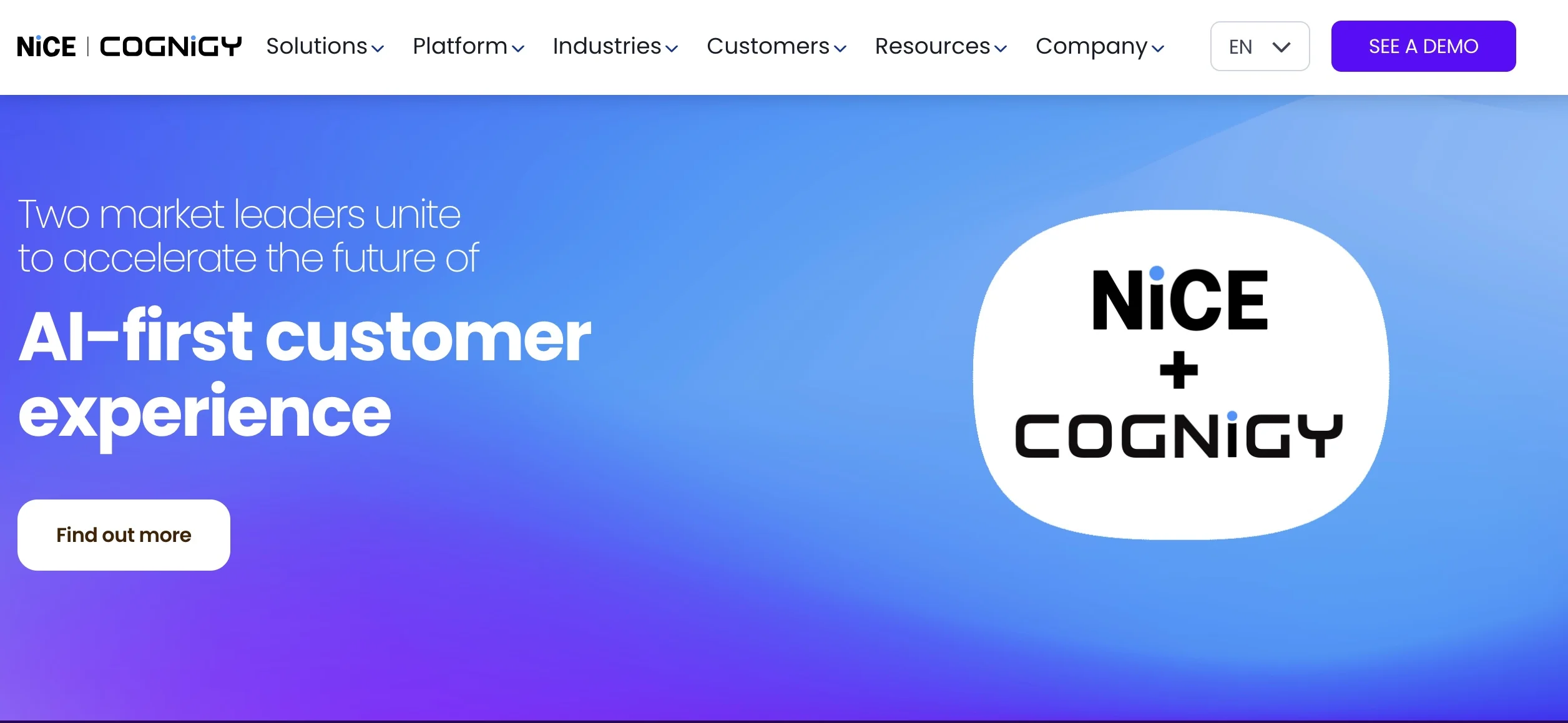
Cognigy is an enterprise-grade customer service platform specializing in voice support for contact centers.
Its low-code editor allows teams to design, launch, and manage complex conversation flows across multiple channels and languages from a single interface, automating tasks like order tracking, appointment scheduling, and KYC verification.
Advantages compared to Kore.ai
- Omnichannel flexibility: Cognigy supports voice, chat, email, social media, and web in a unified way, letting you orchestrate cross-channel experiences from one platform.
- Custom voice options: Cognigy offers support for custom voice solutions, enabling developers to build and test personalized voice agents or features for unique voice experiences.
- Tech stack integration: Cognigy integrates seamlessly with a wide range of tech stack components, allowing it to work within your existing technology infrastructure and continuously improve by learning from data.
- Multiple languages support: Cognigy provides robust multilingual capabilities, supporting customer interactions across multiple languages and dialects to serve global enterprises effectively.
- Advanced orchestration & LLM coordination: Cognigy can manage multiple AI models, decision logic, and context flows simultaneously, giving it more control over complex dialogues and branching than Kore.ai’s more linear NLU flows.
- Visual flow builder with low-code nodes: Its node-based drag-and-drop flow builder lets both non-technical and technical users construct hybrid rule + ML workflows, reducing the barrier compared to Kore.ai’s steeper dev lift in complex cases.
- Flexible deployment options: Cognigy can fit into strict security or data residency requirements, whereas Kore.ai’s deployment modes may be more constrained in certain contexts.
- Enterprise governance & scalability: It includes role-based access control, audit trails, versioning, and is built for multi-region, making it a strong fit for enterprises running large-scale AI call center operations across multiple business units.
Pricing
Pricing is provided through custom quotes tailored to deployment scale and specific business requirements.
While enterprise-grade, its pricing is typically positioned competitively below Kore.ai's common entry point of over $300,000. The models are usage-based, aligning costs directly with conversation volume and the mix of channels used, offering a scalable investment for large contact centers.
G2 Rating: 4.6/5 (13 reviews)
Review: "Overall I loved it but I must mention that it does not support an extensive workflow".
Recommended for:
Enterprise contact centers in highly regulated industries (finance, healthcare) that require on-premises deployment, comprehensive governance features, and broad telephony integration beyond a single vendor.
6. Synthflow
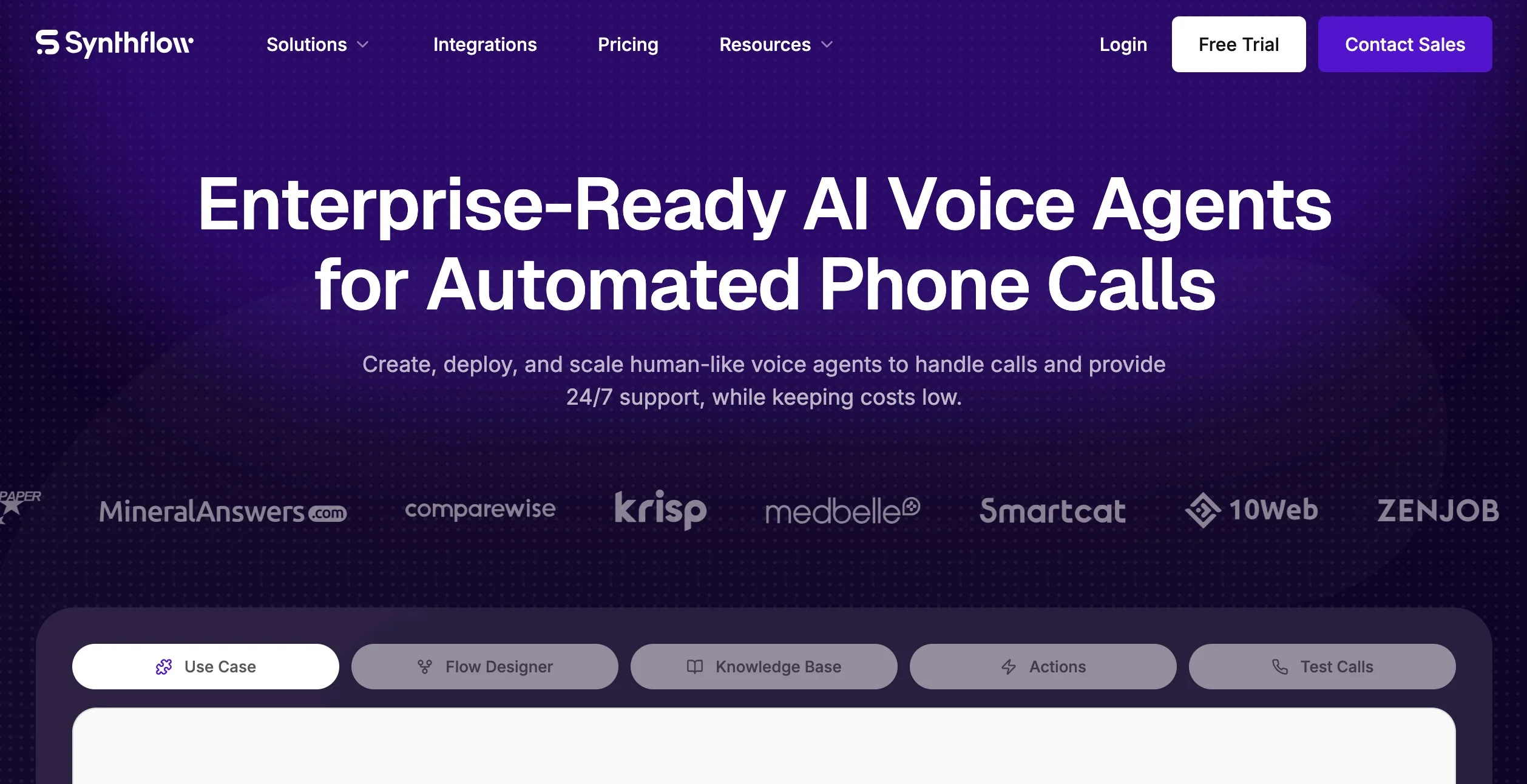
Synthflow is a scalable voice AI with a no-code visual workflow builder, real-time personalization, and deep CRM integrations. Supports HIPAA compliance, inbound routing, and multi-tenant management for agencies. Designed for production-grade voice automation.
Advantages Compared to Kore.ai
- Richer voice & cloning options: Synthflow supports over 300 AI voices and lets you clone voices (e.g. custom or brand voices), while Kore.ai’s voice suite is more limited and doesn’t focus on voice cloning.
- No-code visual builder: Synthflow offers a drag-and-drop agent builder that lets non-technical users create and adjust conversational flows easily, enabling the creation of advanced ai assistant experiences for both voice and chat. In contrast, Kore.ai often demands more developer support for complex voice flows.
- Integrated post-call analysis: Synthflow includes built-in analytics, transcripts, and post-call insights as part of the core product, while in Kore.ai those kinds of capabilities often require extra modules or custom configuration.
- Flexible telephony & integrations: Synthflow supports SIP trunking with any provider and integrates deeply with CRMs (e.g. HubSpot) with minimal friction, and also connects with robotic process automation tools to streamline backend business workflows and automate legacy systems. This gives you more freedom in your infrastructure choices than Kore.ai’s more constrained telephony options.
- Faster onboarding & deployment: Because of its no-code tools and prebuilt templates, Synthflow can get you up and running more quickly without heavy dev lift, while Kore.ai deployments tend to carry longer ramps.
- More flexibility than other platforms: Unlike other platforms, Synthflow offers greater flexibility in speech customization, integration options, and scalability, making it a superior choice for building enterprise-grade conversational AI solutions.
Pricing
Starter plan starts at $29/month for 5,000 minutes and 1 agent. Growth at $99/month includes 20,000 minutes and unlimited agents. Scale plan at $249/month supports 60,000 minutes. Custom enterprise pricing available.
G2 Rating: 4.5/5 (815 reviews)
Review: "What I like best about Synthflow is that it doesn’t bury you in technical complexity. You don’t need to be a coder or spend weeks wiring together APIs just to get a usable AI voice agent".
Recommended for
Marketing teams and enterprises needing robust inbound support automation with compliance needs and deep integrations.
7. Bland
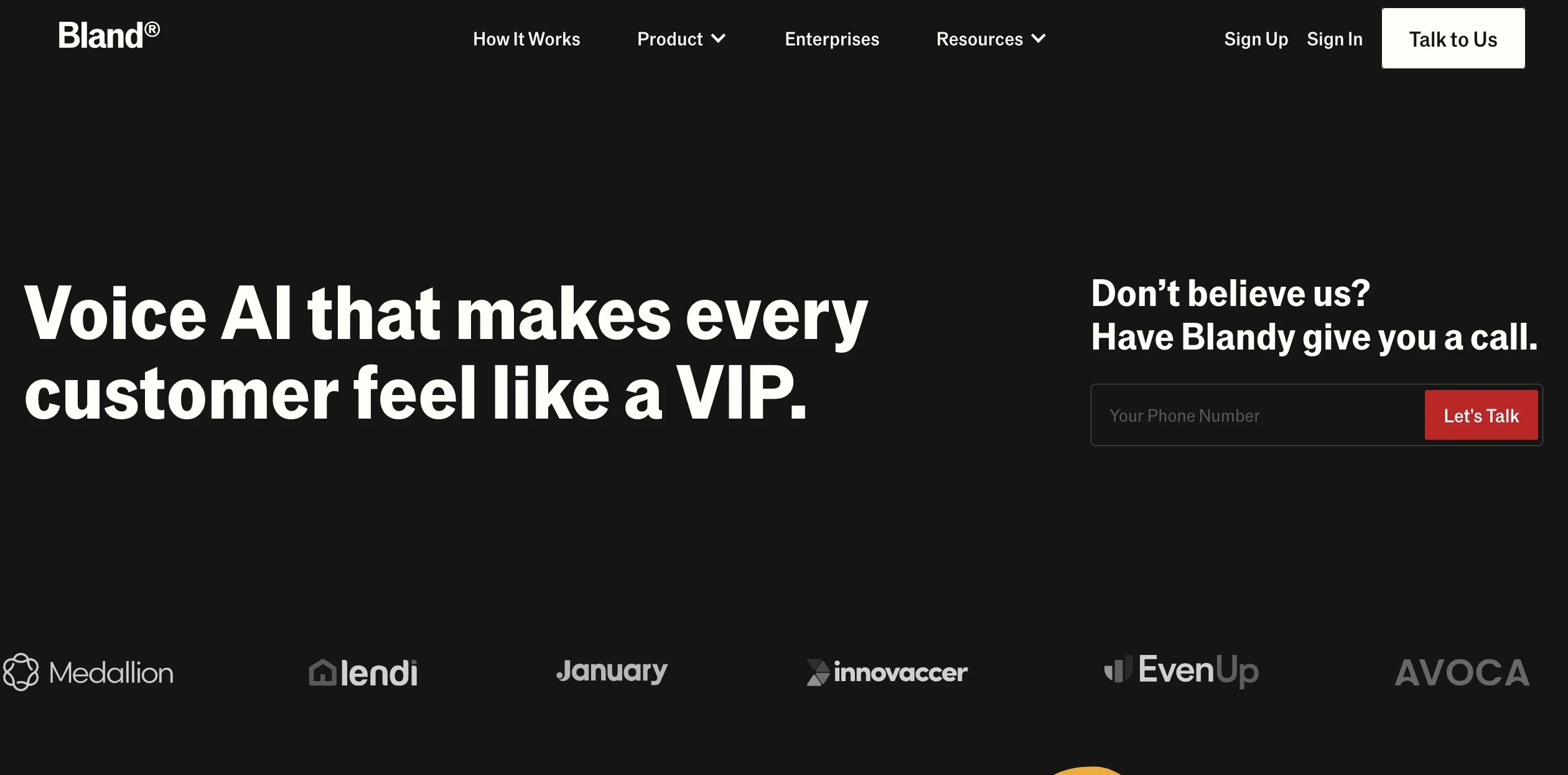
Bland emphasizes hyper-realistic voice experiences with strong security and data governance. It supports high-volume inbound and outbound calling, SMS, and omnichannel workflows. Bland markets itself as capable of scaling up to one million concurrent calls, making it attractive to enterprises that demand resiliency.
Advantages Compared to Kore.ai
- Hyper-realistic voice experience: Bland emphasizes ultra-natural speech with intonation, pauses, and conversational flow, making calls sound more human.
- Massive concurrency & scalability: Bland claims the ability to scale up to 1 million concurrent calls, making it attractive to enterprises running high-volume voice operations such as AI telemarketing or outbound customer engagement.
- Omnichannel + multi-modal support: Bland supports voice, SMS, chat, and omnichannel workflows, giving you more flexibility than a voice-add-on approach.
- Voice bots for custom automation: Bland enables the development of custom voice bots for automation solutions across industries like banking, retail, e-commerce, and healthcare, leveraging advanced AI capabilities to streamline internal processes.
- Native integrations & toolchain compatibility: Bland integrates with CRMs, ERPs, and agency systems via robust APIs, letting you plug into existing infrastructure seamlessly, reducing heavy custom development compared to Kore.ai’s integration overhead.
- Built-in analytics, sentiment & scoring: Every Bland conversation comes with insights like call scoring, sentiment analysis, and summarization out of the box, whereas these often require add-ons or custom work in Kore.ai.
Pricing
No public pricing. Bland generally positions itself at the enterprise tier, with costs reflecting its scale and customization focus.
Product Hunt Rating: 3/5 (10 reviews)
Best for:
Large enterprises with strict requirements for privacy, governance, and brand voice customization at scale.
8. Ada.cx
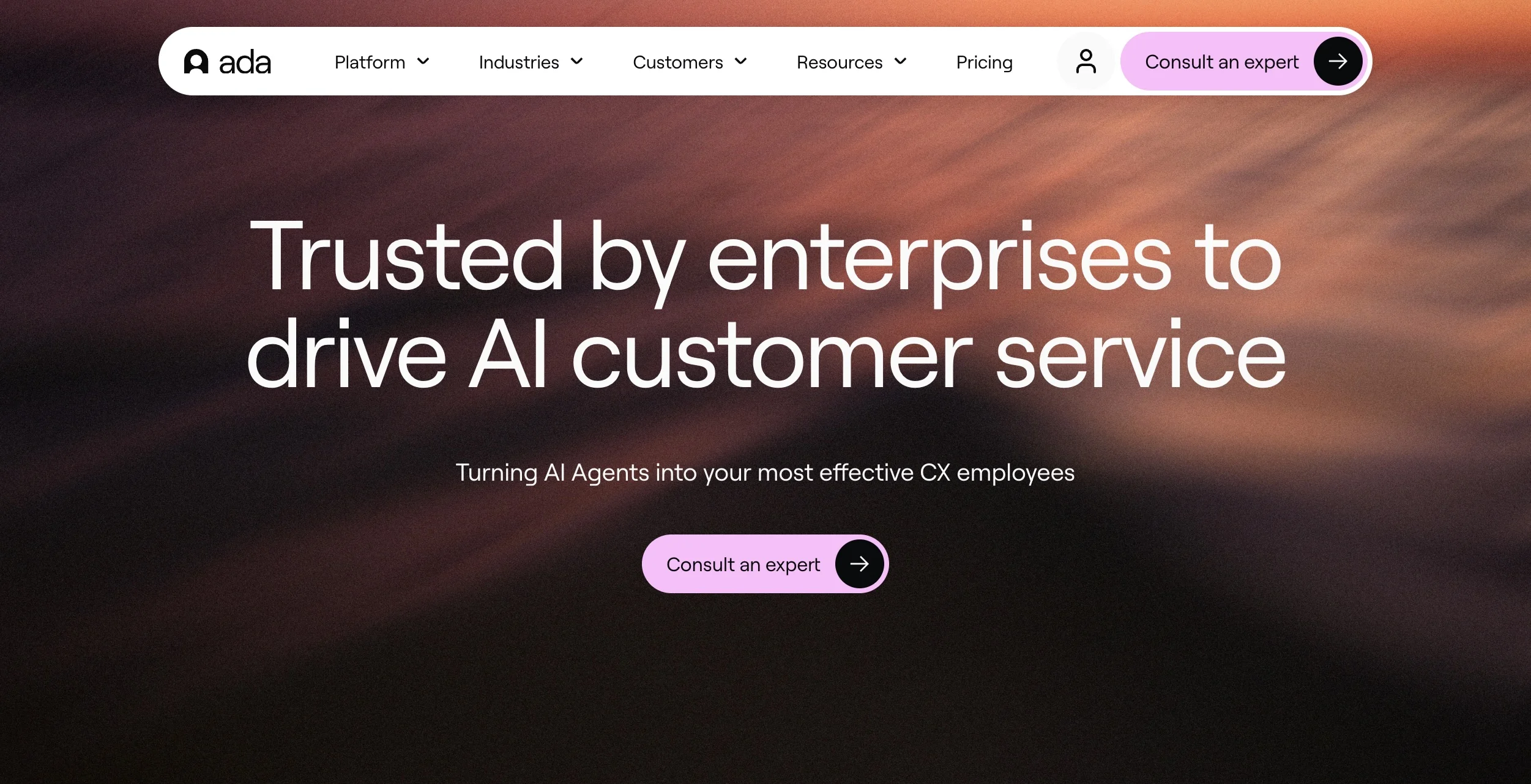
Ada.cx powers AI agents that automate customer service across chat, voice, and email, helping support teams handle complex requests at scale.
Unlike traditional bots that rely on rigid scripts, Ada’s platform was built “AI-first”, meaning its agents can understand intent, trigger workflows, and even escalate to humans when needed, all while maintaining a consistent brand tone.
Advantages compared to Kore.ai
- Faster, no-code setup: Ada’s Playbooks let CX teams build and launch automated workflows without relying on engineers. In contrast, Kore.ai often needs more technical setup and scripting for complex logic.
- Multilingual out of the box: Ada supports 50+ languages natively, making it easier for global brands to deploy consistent customer experiences without heavy localization work.
- AI-first reasoning engine: Ada’s agents are built to understand intent and execute actions across systems, not just respond to inputs. It’s more autonomous than Kore’s rule-heavy approach.
- Seamless integrations and orchestration: Ada connects with CRMs, ticketing systems, and messaging tools right away, so agents can take real actions instead of just routing conversations.
- Enhanced customer engagement: Ada.cx uses AI-powered chatbots and automation to boost customer engagement through personalized interactions and seamless communication across channels.
- Escalation to human agents: When complex or sensitive issues arise, Ada.cx can seamlessly escalate conversations to human agents, ensuring customers receive the empathy and expertise needed.
- Proven scalability and reliability: Ada handles hundreds of millions of customer interactions for enterprise clients, keeping performance steady even under massive peaks.
G2 Rating: 4.6/5 (155 reviews)
Review: “Ada helped our small support team contain the most easy-to-resolve customer inquiries, freeing-up more time for agents to go through our backlog.”
Pricing
Ada uses a performance-based pricing model, where companies pay based on successful resolutions or interaction volume rather than flat usage fees. Exact pricing depends on the number of monthly conversations, integrations, and deployment channels, but most enterprise plans start in the low six figures annually.
Recommended for:
Brands that prioritize customer experience at scale, especially e-commerce, fintech, and telecom companies, where multilingual support and fast automation setup are key.
9. Decagon.ai
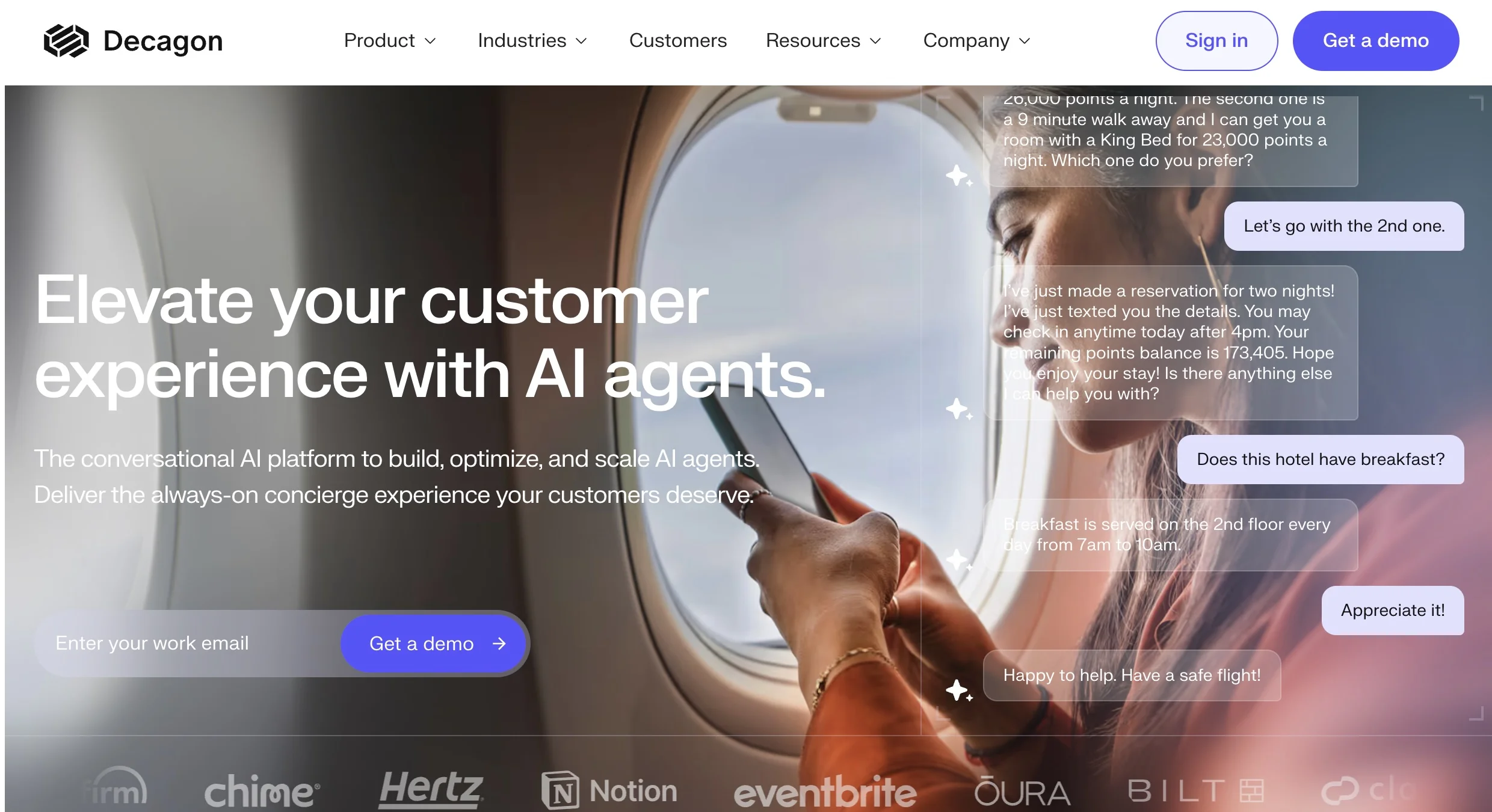
Decagon.ai offers a unified AI engine that auto-resolves customer issues across chat, voice, email, SMS, and custom channels in any language.
Their approach centers on Agent Operating Procedures (AOPs): natural-language instructions that compile into logic, allowing teams to tweak behavior without heavy coding.
Advantages Compared to Kore.ai
- Natural-language logic with AOPs: Decagon’s Agent Operating Procedures let teams express desired behaviors in plain language, which the platform then compiles into executable logic. That gives non-technical teams more control and agility than Kore’s more rigid flow engines.
- Transparent decision paths & explainability: You can trace why the AI agent made a certain decision at each step, audit logic paths, and catch gaps. Decagon treats the AI as an observable system, not a black box.
- Model-agnostic flexibility + hybrid setup: Decagon lets you bring your own LLM or mix multiple models, which gives more freedom to experiment, optimize cost, or swap engines.
- Continuous learning & feedback loop: Decagon’s AI Agent Engine is built as a data flywheel: every interaction feeds insights and training back into the system to constantly refine performance.
- Omnichannel logic + context preservation: Decagon runs its logic across chat, email, voice, SMS, and custom surfaces using a unified platform, and keeps context intact even when conversations shift channels.
Pricing
Decagon frames pricing around value. Their two main tiers are:
- Per-conversation pricing: You pay a flat fee per interaction (whether fully resolved or not). This is the more commonly chosen model among their customers.
- Per-resolution pricing: You only pay when the AI fully resolves a query without escalation. No cost for conversations that require human handoff.
Because Decagon is aimed at enterprise clients with large volumes, their base pricing is custom. In one public review, estimated ranges span $95,000 to $590,900+ per year, depending on complexity, volume, and integrations.
G2 Rating: 4.9/5 (18 reviews)
Review: "The biggest upside of using Decagon isn't simply the assumption of repetitive day-to-day tasks that would normally be done manually, but that Decagon allows us to evaluate data on a much deeper level."
Recommended for:
Organizations that demand high customization, transparency, and outcome-driven automation, especially in sectors like fintech, telecom, or SaaS with large support loads.
10. ElevenLabs
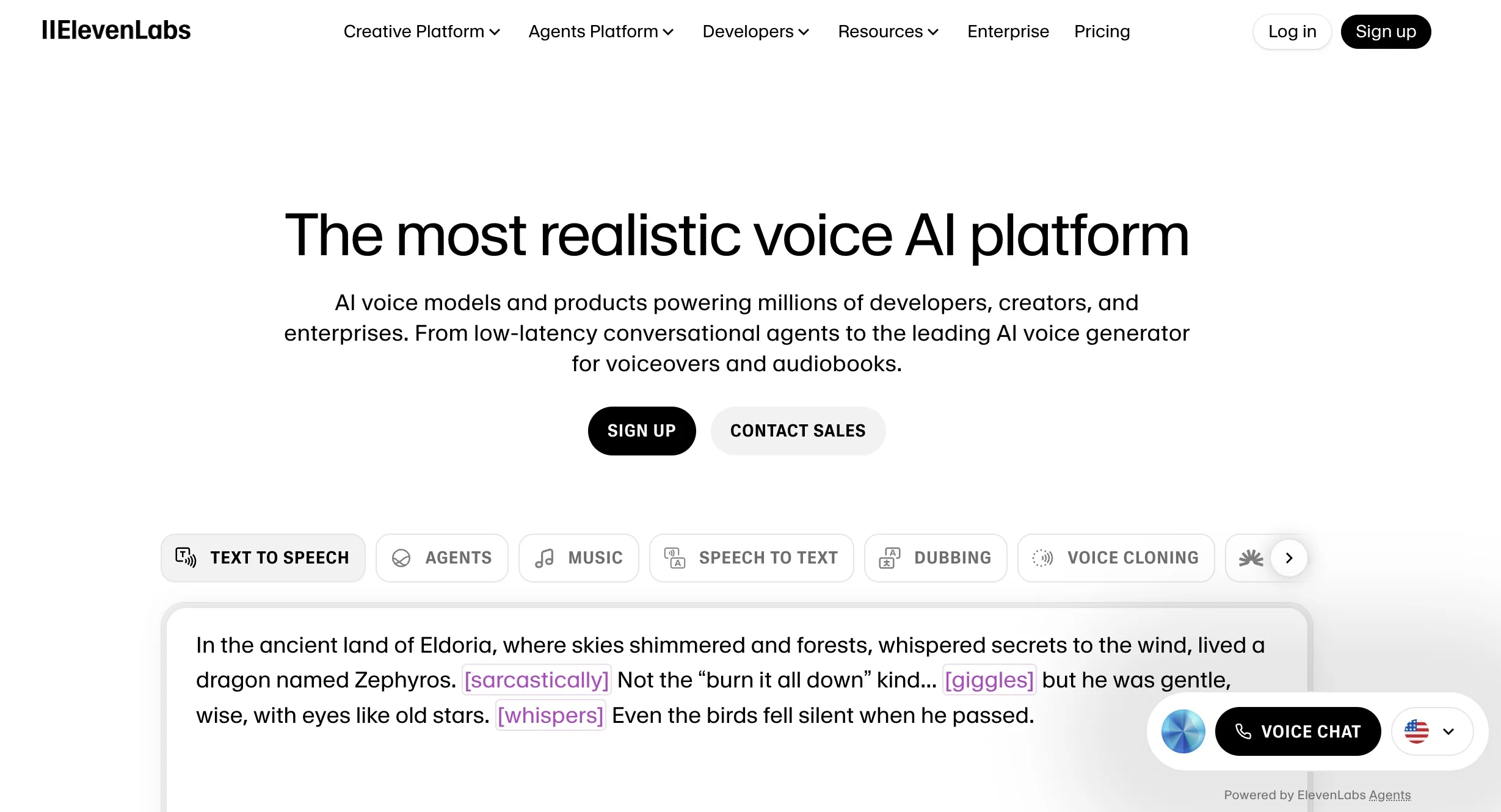
ElevenLabs is best known for its world-class text-to-speech and voice cloning tech, and more recently it’s expanded into conversational AI agents. Their platform can take user input (voice or text), ground it in your data, and produce natural spoken replies.
It’s not yet a full-blown telephony agent system, but it bridges content and voice interaction nicely, especially for brands already working in audio, narration, or voice experiences.
Advantages compared to Kore.ai
- Best-in-class voice realism & expression: ElevenLabs is known for ultra-realistic, emotionally rich voices that sound far more natural than many TTS systems.
- Voice-first, but hybrid voice + text capability: Their Conversational AI platform allows seamless handling of voice and text inputs/outputs, giving flexibility in how users interact.
- Rapid deployment & low latency voice agents: You can spin up voice agents in minutes with configurable APIs and minimal latency, which is often faster than traditional conversational + conversational-platform rollouts.
Pricing
ElevenLabs uses a credit system. You get a bundle of credits (usable for TTS, agents, etc.), and if you exceed them, you buy more.
Example tiers (as of now):
- Free: 10,000 credits / month (≈10 minutes of high-quality TTS or 15 minutes of agent use)
- Starter: $5/month for 30,000 credits
- Creator / Pro / Business / Enterprise: stepping up to 100k, 500k, millions of credits with higher-quality audio, API priority, SLA, etc.
Because it’s usage-based, your total cost will depend heavily on how many agent minutes you use, how much audio you generate, and how premium the voices are.
Recommended for:
If your product or brand already has a voice or audio focus (podcasts, narration, gaming, or voice apps) and you want to layer in conversational agents, ElevenLabs is a powerful pick. It’s especially strong when you care deeply about sound quality, expressiveness, and voice branding. But if your priority is full telephony integration, call switching, deep voice workflows, or super predictable pricing, Vapi (or others) might still lead in those domains.
11. Google Cloud Dialogflow

Google Cloud Dialogflow is a comprehensive development suite for building conversational interfaces for websites, mobile applications, and IoT devices. It is a powerful and flexible platform that is well-suited for a wide range of use cases.
Advantages compared to Kore.ai
- Hybrid control over conversations: Dialogflow CX lets you combine deterministic, rule-based flows with generative AI responses, giving teams fine-grained control over tone, accuracy, and flexibility in every interaction.
- Native Google Cloud integration: Because it’s built into the Google Cloud ecosystem, Dialogflow CX connects seamlessly with BigQuery, Vertex AI, Cloud Functions, and IAM.
- Modular, stateful design: Its flow-and-page structure allows you to build complex multi-turn dialogues that maintain context across steps, simplifying scaling and maintenance for large conversational projects.
- Transparent, usage-based pricing: Google publishes clear per-request and per-second audio rates, so costs are predictable and scalable, a welcome contrast to Kore.ai’s custom enterprise contracts.
- Enterprise reliability and performance: Backed by Google’s infrastructure, Dialogflow CX offers global scalability, strong uptime, and continuous AI model improvements, ensuring stable, high-quality deployments at scale.
Pricing
Google Cloud Dialogflow's pricing structure is pay-as-you-go and varies significantly between its two versions: ES and CX.
For Dialogflow CX, the more advanced, enterprise-oriented edition, pricing is based on the number of requests (text, voice, or sessions). For example, text requests cost $0.007 per request.
For voice, the cost is $0.001 per second of audio, which includes both Speech-to-Text and Text-to-Speech. While this offers flexibility, costs can accumulate quickly in high-volume use cases.
It's crucial to account for the separate voice service charges, which are not included in the base request fee and can double or triple the total cost of a call. Google offers new customers a $600 credit to trial the platform.
G2 Rating: 4.4/5 (134 reviews)
Review: "Customer support can sometimes be slow or less responsive. In addition, while extensive, some documentation can be difficult to navigate."
Recommended for:
Businesses that are already invested in the Google Cloud ecosystem or that require a highly scalable and flexible conversational AI platform.
12. Amazon Lex
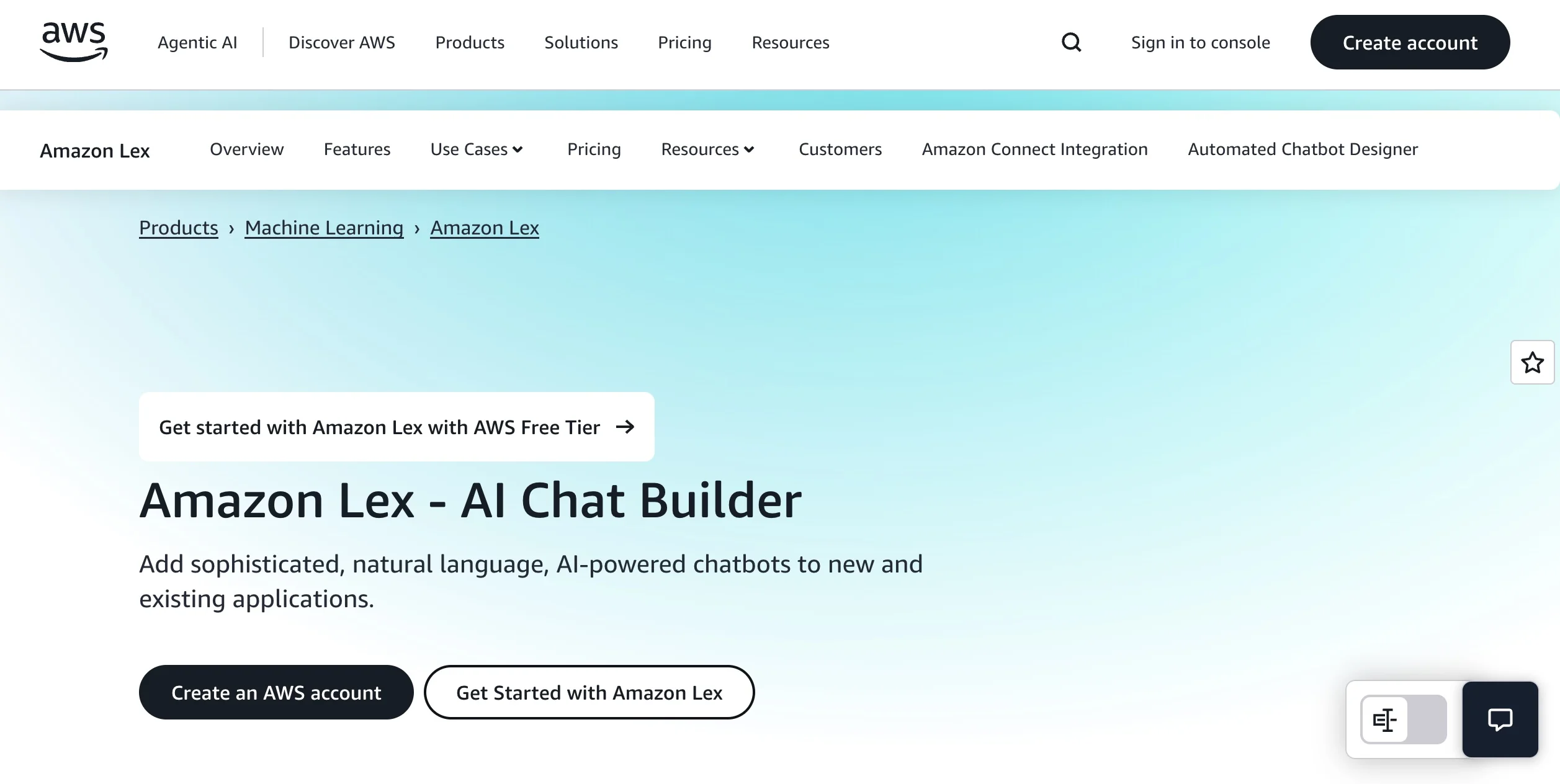
Amazon Lex is a service for building conversational interfaces into any application using voice and text. It is based on the same technology that powers Amazon Alexa, and it offers a range of features for building and deploying chatbots and voice assistants.
Advantages compared to Kore.ai
- Deep AWS ecosystem integration: Lex plugs natively into AWS services like Lambda, IAM, S3, Kendra, and more.
- Pay-as-you-go pricing model: Lex charges per request (voice and text), which can be more cost-efficient than Kore.ai’s large up-front licensing in many scenarios.
- Fully managed infrastructure: You don’t need to worry about provisioning servers, scaling clusters, or maintenance, Lex auto-scales as usage grows.
- Wide channel support & flexibility: Lex supports both voice and text channels, and can be extended with integrations (e.g. via AWS SDKs) to many front ends and devices.
Pricing
Billing is based on the number of requests processed by the bot.
For voice interactions, the cost is $0.004 per request.
For text requests, the price is $0.00075 per request.
Under its free tier, Amazon Lex allows for up to 10,000 text requests and 5,000 speech requests per month, free for the first year. This model is very cost-effective for applications with low-to-moderate interaction volumes.
However, for large-scale voice operations, it's important to accurately calculate the total number of conversational "turns" to forecast monthly costs precisely.
G2 Rating: 4.2/5 (37 reviews)
Review: "Lex is easy to configure. Training and configuring the chatbot is simple and easy."
Recommended for:
Businesses that are already using AWS or that require a cost-effective and scalable conversational AI solution.
Why Retell is a Top Choice Among Alternatives
Retell AI stands out as a top choice among Kore.ai alternatives due to its focus on voice, its low latency, and its flexible API.
The platform is designed to provide a seamless and natural conversational experience, and it is highly customizable to meet the specific needs of your business. With its transparent pricing and commitment to quality, Retell AI is a compelling option for any enterprise that is looking to automate its phone calls with AI voice agents.
Ready to experience the future of voice AI? Explore Retell AI's solutions and see how our platform can transform your customer interactions. Schedule a demo today and discover the power of real-time, human-like conversations.
See how much your business could save by switching to AI-powered voice agents.
Your submission has been sent to your email
ROI Result
Total Human Agent Cost
AI Agent Cost
Estimated Savings
A Demo Phone Number From Retell Clinic Office

